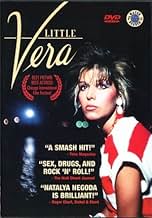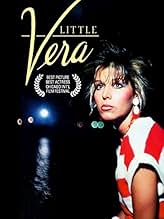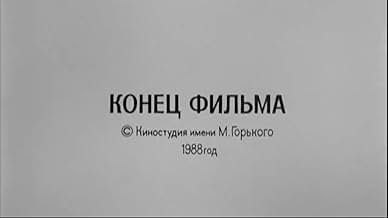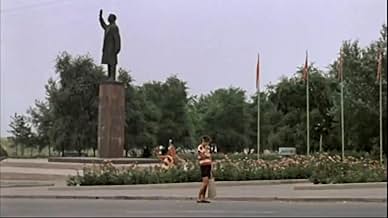NOTE IMDb
6,9/10
2,3 k
MA NOTE
Les frasques de Vera qui habite dans une petite ville industrielle. Vera a quitté l'école jeune et fait les 400 coups, suivant ses désirs afin d'oublier les disputes familiales, son père alc... Tout lireLes frasques de Vera qui habite dans une petite ville industrielle. Vera a quitté l'école jeune et fait les 400 coups, suivant ses désirs afin d'oublier les disputes familiales, son père alcoolique et le sombre avenir qui l'attend.Les frasques de Vera qui habite dans une petite ville industrielle. Vera a quitté l'école jeune et fait les 400 coups, suivant ses désirs afin d'oublier les disputes familiales, son père alcoolique et le sombre avenir qui l'attend.
- Réalisation
- Scénario
- Casting principal
- Récompenses
- 7 victoires et 9 nominations au total
Aleksandr Negreba
- Viktor - brat Very
- (as Alexander Alexseyev Negreba)
Aleksandra Tabakova
- Lenka Chistyakova
- (as Alexandra Tabakova)
Gennady Goryachev
- Sledovatel
- (as G. Goryachev)
Vadim Zakharchenko
- Muzhchina v bolnichnoy palate
- (as V. Zakharchenko)
Mariya Khmelik
- podruga Viktora
- (as M. Khmelik)
Maksim Nayrabe
- brat Lenki Chistyakovoy
- (as Maxim Nairabe)
Avis à la une
This once notorious drama (at least in its own country) was hailed as a breakthrough when first released simply for daring to show modern Soviet life without the usual State-approved propaganda halo, in all its actual anti-bureaucratic grubbiness. But watching the film on this side of the erstwhile Iron Curtain only reinforces the notion that Soviet youth culture is thirty years behind the rest of the world: despite the often oppressive details it might be just another quaint teen delinquency relic from early 1960s Hollywood, dubbed into Russian and updated with casual sex and drug abuse. In other words, it's hardly a revelation to discover that Russian kids are just as misunderstood by adults as their American role models. But while the attitudes may look dated to Western audiences, it's at least an honest attempt to portray something of the boredom and defiant posturing of youth, in a country not exactly noted for addressing its generation gap.
In Russia, the ordinary teenager Vera (Natalya Negoda) lives a leisured life with her drunkard father and her simpleton mother, without working and waiting for the calling for a technical course of telephone operator. Her brother Victor (Aleksandr Negreba) lives in Moscow with the family of his own and occasionally visits his dysfunctional family and Vera, being always motive for arguing. When Vera meets the student of university Sergei (Andrei Sokolov), they fall in love for each other and decide to get married. Sergei moves to Vera's house, but lives in conflict with her father. This relationship leads the family to a tragedy.
I have just seen "Malenkaya Vera", and I liked a lot this deep family drama. I am not familiarized with the life style in the former URSS, but there are some unusual behaviors that I found very interesting. The first one, when Victor tells Vera that she was conceived not because her parents wanted to have her, but because they wanted to move to a larger apartment. Another one, when the family goes to the beach in a truck. Many difficulties of Vera's family and their friends, the repression in the park and other situations pictured in the movie are common in Third World countries. This low budget movie is very well-directed, and the story is very profound and real. The cast has great performances and the actress Natalya Negoda is very beautiful. In the cover of the Brazilian VHS, released by Sagres distributor, there is information that Natalya Negoda was the centerfold of Playboy magazine. I am not sure how precise are the subtitles in Portuguese, since many long sentences spoken in Russian are limited to short translation in few words. My vote is seven.
Title (Brazil): "A Pequena Vera" ("The Little Vera")
I have just seen "Malenkaya Vera", and I liked a lot this deep family drama. I am not familiarized with the life style in the former URSS, but there are some unusual behaviors that I found very interesting. The first one, when Victor tells Vera that she was conceived not because her parents wanted to have her, but because they wanted to move to a larger apartment. Another one, when the family goes to the beach in a truck. Many difficulties of Vera's family and their friends, the repression in the park and other situations pictured in the movie are common in Third World countries. This low budget movie is very well-directed, and the story is very profound and real. The cast has great performances and the actress Natalya Negoda is very beautiful. In the cover of the Brazilian VHS, released by Sagres distributor, there is information that Natalya Negoda was the centerfold of Playboy magazine. I am not sure how precise are the subtitles in Portuguese, since many long sentences spoken in Russian are limited to short translation in few words. My vote is seven.
Title (Brazil): "A Pequena Vera" ("The Little Vera")
Vera is a rebellious daughter of dissatisfied proletariat parents. Her father Kolya is an alcoholic. They keep referring to her older brother Victor who is a success in Moscow. They don't like her lifestyle or her friends. She falls for Sergei and decides to marry. It raises the tension in the family. Sergei and and Kolya don't get along. Sergei starts living with the family but it doesn't go well in one violent drunken confrontation.
The film looks pretty grainy and weak compared to most indies of that time. It was sold as the first sex scene in Soviet cinema but there is nothing erotic about this movie. It is gritty, and dirty. The overbearing poverty is the backdrop. That is the more compelling aspect. The story of a rebellious daughter and family dysfunction is not necessarily original. It is somewhat new to see it portrayed about Russia at that time. The movie is filled with a downtrodden sadness and that goes for the lead actress Natalya Negoda. It's fine as a grungy indie and notable for being a Soviet film.
The film looks pretty grainy and weak compared to most indies of that time. It was sold as the first sex scene in Soviet cinema but there is nothing erotic about this movie. It is gritty, and dirty. The overbearing poverty is the backdrop. That is the more compelling aspect. The story of a rebellious daughter and family dysfunction is not necessarily original. It is somewhat new to see it portrayed about Russia at that time. The movie is filled with a downtrodden sadness and that goes for the lead actress Natalya Negoda. It's fine as a grungy indie and notable for being a Soviet film.
Please Note: This review mentions key moments in this film. Do not read if you have not seen the movie!
Vera, the protagonist in the film Little Vera, lives in a closed, cramped world. She is trying to escape, both emotionally and physically, but in the end is no closer to freedom. Most of the reviews I read brought up the recurrent theme of limited space in this movie. The family apartment represents Vera's closed world in the simplest sense. She has no room to move, no room to grow and no room to find herself. Everywhere she turns the finds herself face to face with her mother, father, brother or simply a wall.
However, the family apartment is only one way that the director maintains this constant feeling of confinement. Throughout the film, Vera is rarely shown at a distance. She is always in a small room, or sitting directly next to someone else, or being physically smothered by those around her (Andrei, Sergei, etc.). She is almost always in physical contact with another person. During the rare times that she truly is alone, such as when she is attempting suicide, the camera only zooms in closer. In this way, the lens replaces the walls and smothering humanity, itself becoming an object of confinement.
If visual effects of confinement aren't possible, then sound is used to heighten the sense of disparity. Most of the dialogue in Little Vera, with the exception of less intense moments when the music volume is increased, is shouted, yelled or screamed. Vera's family is constantly in conflict and even the most civil dinner eventually erupts into argument. I found the constant barrage of sound equally as suffocating as the repeated scenes within the tiny apartment, and twice as hard on the nerves. Unlike Vera, however, we could leave when it was all over.
It is hard not to feel sorry for Vera at the end of the movie, but is our sympathy justified? She returns, time and again, to the very apartment and situation that is slowly taking the life out of her. Can she really be considered a victim if she is bringing a lot of her misery upon herself?
Vera, the protagonist in the film Little Vera, lives in a closed, cramped world. She is trying to escape, both emotionally and physically, but in the end is no closer to freedom. Most of the reviews I read brought up the recurrent theme of limited space in this movie. The family apartment represents Vera's closed world in the simplest sense. She has no room to move, no room to grow and no room to find herself. Everywhere she turns the finds herself face to face with her mother, father, brother or simply a wall.
However, the family apartment is only one way that the director maintains this constant feeling of confinement. Throughout the film, Vera is rarely shown at a distance. She is always in a small room, or sitting directly next to someone else, or being physically smothered by those around her (Andrei, Sergei, etc.). She is almost always in physical contact with another person. During the rare times that she truly is alone, such as when she is attempting suicide, the camera only zooms in closer. In this way, the lens replaces the walls and smothering humanity, itself becoming an object of confinement.
If visual effects of confinement aren't possible, then sound is used to heighten the sense of disparity. Most of the dialogue in Little Vera, with the exception of less intense moments when the music volume is increased, is shouted, yelled or screamed. Vera's family is constantly in conflict and even the most civil dinner eventually erupts into argument. I found the constant barrage of sound equally as suffocating as the repeated scenes within the tiny apartment, and twice as hard on the nerves. Unlike Vera, however, we could leave when it was all over.
It is hard not to feel sorry for Vera at the end of the movie, but is our sympathy justified? She returns, time and again, to the very apartment and situation that is slowly taking the life out of her. Can she really be considered a victim if she is bringing a lot of her misery upon herself?
What I found so interesting about this film was the incredible contrast of subject matter and mood between this film and the Russian films that came before it.
A product of Glasnost, in an attempt to modernize the cinema and remove censorship, allowed for Russians to be shown realistically and their individual stories be told instead of a happy Russian body of agreeable people.
The film addresses the reality of dysfunctional families, crammed into small apartments, alcoholism, poverty, and young adults confused and rebelling against authority.
Little Vera depicts Vera and her family with attitudes of hopelessness, apathy and loneliness.
I liked the movie for the fact that it is ground breaking showing problematic issues and stories of individuals that were never or could never be shown on screen previously under oppressive governments.
I personally wouldn't watch it again. Its worth watching once! Once was enough for me because I hated all the characters and was left depressed after watching a movie where people are constantly fighting but that- I think is the point of the film.
A product of Glasnost, in an attempt to modernize the cinema and remove censorship, allowed for Russians to be shown realistically and their individual stories be told instead of a happy Russian body of agreeable people.
The film addresses the reality of dysfunctional families, crammed into small apartments, alcoholism, poverty, and young adults confused and rebelling against authority.
Little Vera depicts Vera and her family with attitudes of hopelessness, apathy and loneliness.
I liked the movie for the fact that it is ground breaking showing problematic issues and stories of individuals that were never or could never be shown on screen previously under oppressive governments.
I personally wouldn't watch it again. Its worth watching once! Once was enough for me because I hated all the characters and was left depressed after watching a movie where people are constantly fighting but that- I think is the point of the film.
Le saviez-vous
- AnecdotesThis was the first Soviet film to depict graphic sexual intercourse on screen.
- Bandes originalesHeaven And Hell
(uncredited)
Written by Dieter Bohlen
Performed by C.C. Catch
Produced by Dieter Bohlen
[plays during playback of the video clip of the same name C. C. Catch]
Meilleurs choix
Connectez-vous pour évaluer et suivre la liste de favoris afin de recevoir des recommandations personnalisées
- How long is Little Vera?Alimenté par Alexa
Détails
Box-office
- Montant brut aux États-Unis et au Canada
- 1 262 598 $US
- Week-end de sortie aux États-Unis et au Canada
- 23 950 $US
- 16 avr. 1989
- Montant brut mondial
- 1 262 598 $US
Contribuer à cette page
Suggérer une modification ou ajouter du contenu manquant

Lacune principale
By what name was La petite Véra (1988) officially released in India in English?
Répondre





























